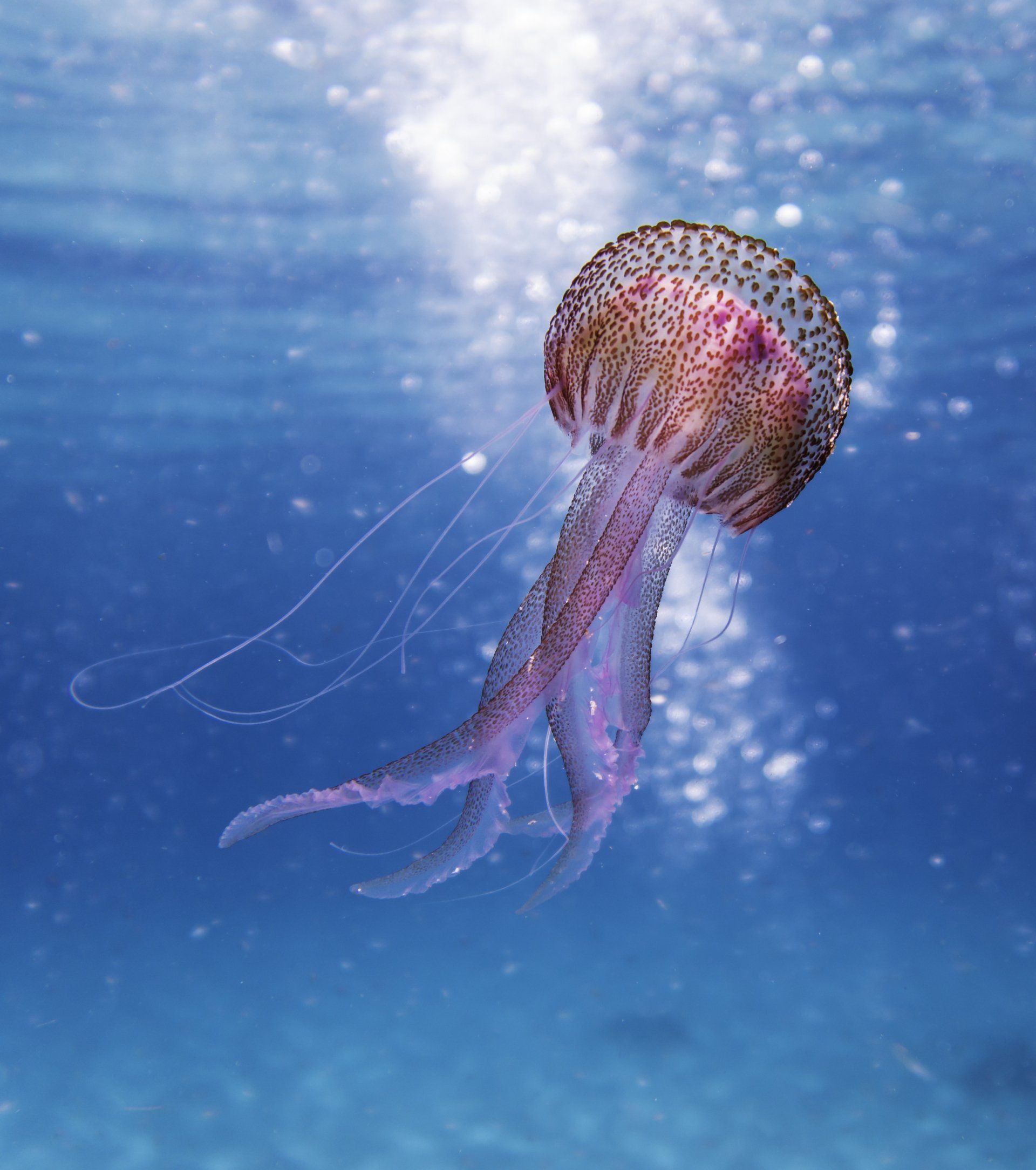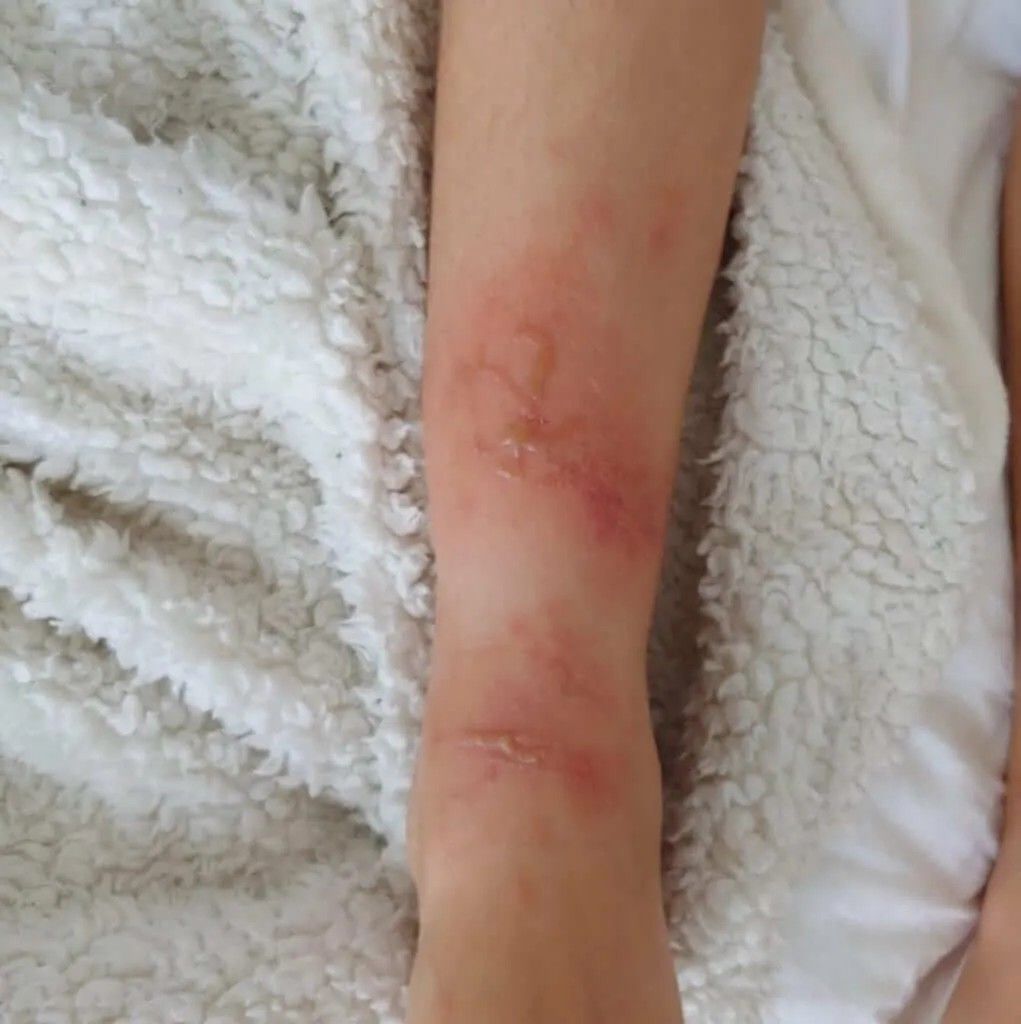Orange Beach, Ala. – (OBA) –
Though it’s commonly reported that humans are stung by jellyfish millions of times a year around the world, it still hurts and can be very painful or even dangerous to some of its victims. The staff at Very Well Health have made a list of their suggestions for sting treatments.
Jellyfish tentacles have thousands of nematocysts that can pierce the skin and inject venom. Depending on the species and the venom dose, a sting can cause reactions ranging from mild to severe and even life-threatening.
The common symptoms of a mild jellyfish sting may include:
- Pain, which may be intense and may radiate outward from the site of the sting
- Red or purplish “track marks” along the route of contact with the tentacle
- Local itching and swelling
- Rash
The amount of time a jellyfish sting lasts can vary by species. Stings from small bluebottle jellyfish may last for one hour.5 A sting from the Australian sea wasp (Chironex fleckeri)—described by some as the most lethal jellyfish in the world—can be deadly, especially in small children.
First Aid
There are three steps commonly recommended for first aid treatment of a jellyfish sting:
- Rinse: Rinse away the tentacles using hot water if possible. If hot water isn’t available, use salt water rather than fresh. Freshwater may worsen the pain.
- Remove tentacles: Peel off any remaining tentacles with a gloved hand or tweezers. Avoid using bare hands as you risk getting stung again.
- Take a hot bath: This can help extract some of the venom from the wound. The general rule is to bathe at the hottest possible temperature you can tolerate (at least 108 degrees F and up to 140 degrees F).
For jellyfish stings near the eyes, thoroughly rinse the eye with seawater and then get to the emergency department as soon as possible. The healthcare team will flush your eye with saline (a mixture of salt and water similar to tears), remove nematocysts, and give you medicated eye drops and pain medication. They might also recommend seeing an opthalmologist—a doctor specializing in eye care.
Over-the-Counter Medications
Once you have removed the tentacles and immersed the wound in hot water, there are things you can do to control pain and promote healing. Over-the-counter (OTC) medications include:
- Calamine lotion to cool the skin and dry oozing skin
- Topical corticosteroids such as hydrocortisone cream to reduce inflammation and pain
- Tylenol (acetaminophen) to alleviate pain
- Nonsteroidal anti-inflammatory drugs (NSAIDs) like Advil (ibuprofen) and Aleve (naproxen) to reduce pain and swelling
An ice pack is also an effective remedy for symptoms of a jellyfish sting, including pain, swelling, and itching. Place a cloth between the ice pack and your skin, and apply the ice for no longer than 15 minutes to prevent frostbite.
Signs of Severe Reactions
There is a lot still unknown about the causes of a severe reaction to jellyfish stings, in part because there are over 2,000 species of jellyfish around the world.
In some cases, the symptoms may be caused by the venom itself (typically a neurotoxic reaction affecting the heart and respiration). In others, a sting may provoke a severe reaction known as anaphylaxis, in which the immune system overreacts to the venom. Both may be involved and are often difficult to tell apart.
In most cases, a severe reaction will occur immediately or soon after the sting. However, if anaphylaxis is involved, reactions have been known to be delayed for days and even weeks.
Symptoms of a severe jellyfish sting that require immediate medical care include:
- Shortness of breath
- Wheezing
- Chest tightness
- Nausea or vomiting
- Hives
- Numbness or tingling
- Muscle cramps
- Blistering skin
- Difficulty swallowing
- Rapid heartbeat
- Pain in various parts of the body
- Dizziness or fainting
If you or someone you are with experience any of these symptoms, call 911 or have someone rush you to the nearest emergency department.
If left untreated, anaphylaxis can lead to shock, respiratory obstruction due to swelling, cardiac or respiratory arrest, or death.
Treatment of Anaphylaxis
Anaphylaxis is treated as a medical emergency in a hospital. The treatment starts with an injection of epinephrine (adrenaline), which helps relax the airways, so you can breathe easier and tightens blood vessels to increase blood pressure. This latter effect helps reduce the risk of shock. Afterward, you may be given oxygen, intravenous (IV) fluids, and medications like cortisone, albuterol, and antihistamines to improve breathing and/or halt the allergic response.
What Not to Do
There are a lot of myths and misconceptions about how you should treat jellyfish stings. Few of these homespun remedies have any research to support their use and may cause more harm than good.
For example, some people recommend rinsing a jellyfish sting with white vinegar to relieve pain, but the evidence is split on whether this actually helps. The benefits appear to differ by species.
A 2017 study of the lion’s mane jellyfish suggests that rinsing a sting with seawater may actually increase the release of venom while rinsing with vinegar has no such effect. By contrast, rinsing a bluebottle jellyfish sting with vinegar often makes the sting worse.
Other things you should NOT do to treat a jellyfish sting include:
- Scraping out stingers
- Rinsing with cold, fresh water
- Applying meat tenderizer
- Applying alcohol
- Rubbing the sting with a towel
- Applying pressure bandages
To Pee or Not to Pee?
Do not pee on a jellyfish sting. Despite what you may have heard or seen on TV, peeing on a jellyfish sting may make the pain worse and will do little if anything to “neutralize” the venom. Moreover, peeing on a tentacle may cause it to contract, injecting more venom into the skin.













